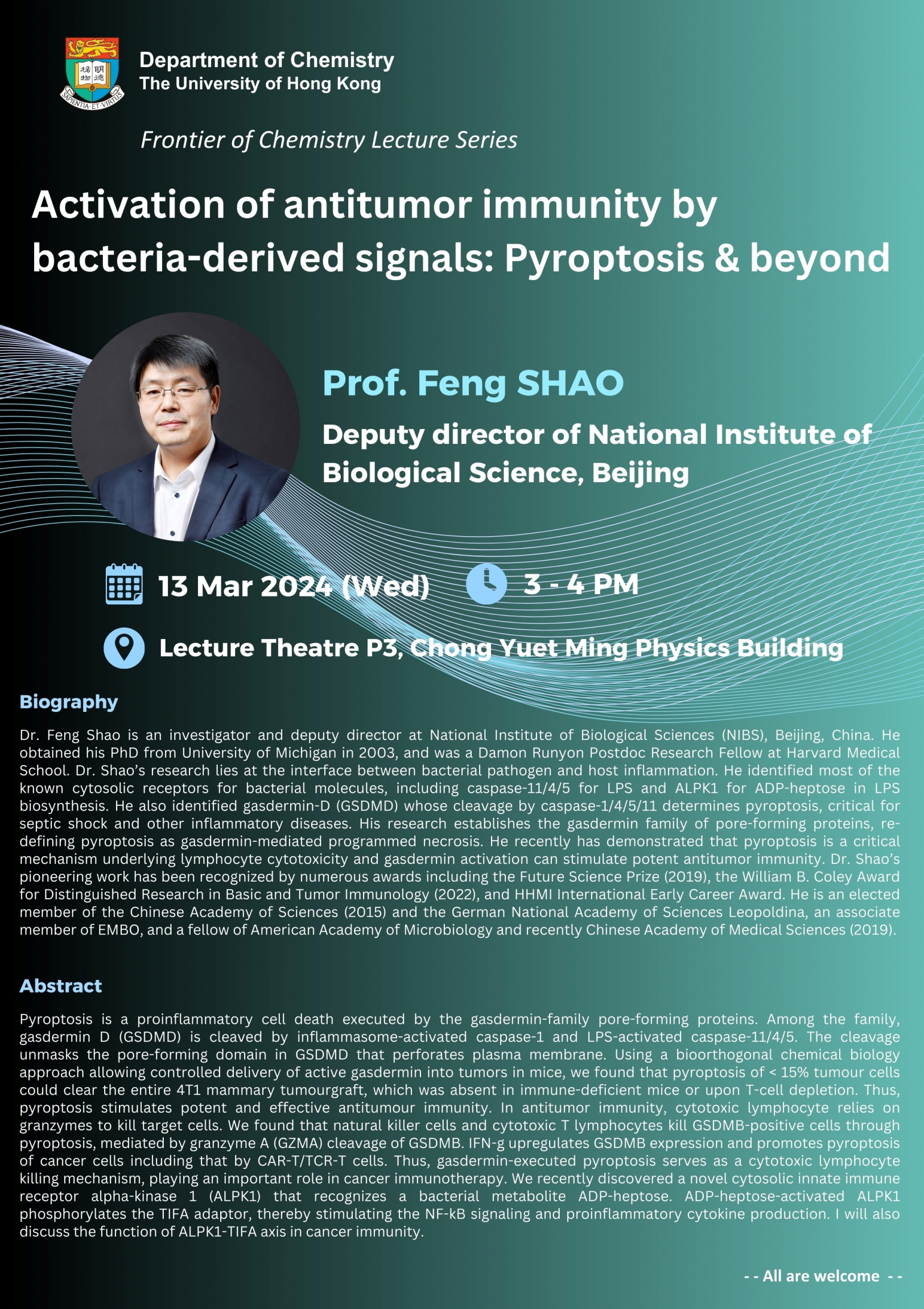| Date | 13 Mar 2024 |
| Time | 3:00 pm - 4:00 pm (HKT) |
| Venue | Lecture theatre P3, Chong Yuet Ming Physics Building |
| Speaker | Prof. Feng SHAO |
| Institution | Deputy Director of National Institute of Biological Science, Beijing |
 Title:
Title:
Activation of antitumor immunity by bacteria-derived signals: Pyroptosis & beyond
Schedule:
Date: 13th March, 2024 (Wednesday)
Time: 3 - 4 pm (HKT)
Venue:
Lecture theatre P3, Chong Yuet Ming Physics Building
Speaker:
Prof. Feng SHAO
Deputy director of National Institute of Biological Science, Beijing
Bolography:
Dr. Feng Shao is an investigator and deputy director at National Institute of Biological Sciences (NIBS), Beijing, China. He obtained his PhD from University of Michigan in 2003, and was a Damon Runyon Postdoc Research Fellow at Harvard Medical School. Dr. Shao’s research lies at the interface between bacterial pathogen and host inflammation. He identified most of the known cytosolic receptors for bacterial molecules, including caspase-11/4/5 for LPS and ALPK1 for ADP-heptose in LPS biosynthesis. He also identified gasdermin-D (GSDMD) whose cleavage by caspase-1/4/5/11 determines pyroptosis, critical for septic shock and other inflammatory diseases. His research establishes the gasdermin family of pore-forming proteins, re-defining pyroptosis as gasdermin-mediated programmed necrosis. He recently has demonstrated that pyroptosis is a critical mechanism underlying lymphocyte cytotoxicity and gasdermin activation can stimulate potent antitumor immunity. Dr. Shao’s pioneering work has been recognized by numerous awards including the Future Science Prize (2019), the William B. Coley Award for Distinguished Research in Basic and Tumor Immunology (2022), and HHMI International Early Career Award. He is an elected member of the Chinese Academy of Sciences (2015) and the German National Academy of Sciences Leopoldina, an associate member of EMBO, and a fellow of American Academy of Microbiology and recently Chinese Academy of Medical Sciences (2019).
Abstract:
Pyroptosis is a proinflammatory cell death executed by the gasdermin-family pore-forming proteins. Among the family, gasdermin D (GSDMD) is cleaved by inflammasome-activated caspase-1 and LPS-activated caspase-11/4/5. The cleavage unmasks the pore-forming domain in GSDMD that perforates plasma membrane. Using a bioorthogonal chemical biology approach allowing controlled delivery of active gasdermin into tumors in mice, we found that pyroptosis of < 15% tumour cells could clear the entire 4T1 mammary tumourgraft, which was absent in immune-deficient mice or upon T-cell depletion. Thus, pyroptosis stimulates potent and effective antitumour immunity. In antitumor immunity, cytotoxic lymphocyte relies on granzymes to kill target cells. We found that natural killer cells and cytotoxic T lymphocytes kill GSDMB-positive cells through pyroptosis, mediated by granzyme A (GZMA) cleavage of GSDMB. IFN-g upregulates GSDMB expression and promotes pyroptosis of cancer cells including that by CAR-T/TCR-T cells. Thus, gasdermin-executed pyroptosis serves as a cytotoxic lymphocyte killing mechanism, playing an important role in cancer immunotherapy. We recently discovered a novel cytosolic innate immune receptor alpha-kinase 1 (ALPK1) that recognizes a bacterial metabolite ADP-heptose. ADP-heptose-activated ALPK1 phosphorylates the TIFA adaptor, thereby stimulating the NF-kB signaling and proinflammatory cytokine production. I will also discuss the function of ALPK1-TIFA axis in cancer immunity.
- ALL ARE WELCOME -
